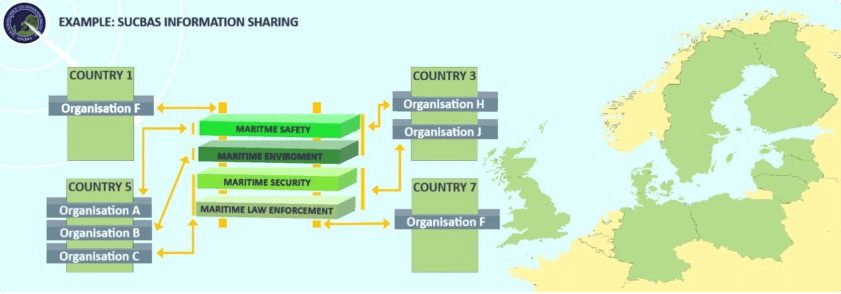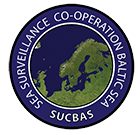SUCBAS Overview
At any given moment one could find more than 2000 ships at the sea in the Baltic. The Baltic Sea is an essential lifeline for the economy of the bordering states and its importance is growing in the recent years.
At the same time, it has always been a sea of destiny for Northern Europe and brought war and peace as well as prosperity to our nations. With the increase of ship traffic and the growing integration within Europe the necessity for a simple and effective way to exchange information about the shipping on the Baltic became evident.
Sharing information on the other hand depends on trust and means. The means have been diplomatic channels, which have been very time consuming and were in no way “real-time”. Trust on the other hand will only be built over time and depends on actually sharing information.

In 2008 an initiative was taken by Sweden and Finland to enlarge their existing co-operation “Surveillance- Cooperation Finland-Sweden (SUCFIS)” to encompass all countries around the Baltic Sea and in September the same year a seminar was hosted in Sweden on that very subject. The seminar was attended by most North European countries.
Building upon the spirit and lessons learned from SUCFIS the first SUCBAS Conference was conducted in March 2009, hosted by Finland. The countries Finland, Sweden, Denmark, Germany, Estonia and Lithuania signed the SUCBAS Letter of Intent. Today it embraces all likeminded states surrounding the Baltic Sea, as well as the United Kingdom that joined in 2015.
Nowadays SUCBAS is a 24/7 operational cornerstone for sea surveillance information exchange and co-operation within the Baltic Sea area and its approaches. The aim of SUCBAS is to enhance Maritime Situational Awareness (MSA) benefiting maritime safety, security, environmental and law enforcement activities in the region by sharing relevant maritime data, information and knowledge between the participants. It further aims to emphasize the overall importance of the safety and security of the sea, the importance of Civil and Military Cooperation, the global responsibilities in the maritime domain, and to promote the capabilities of regional cooperation in SUCBAS.
The nations can share the information among national governmental institutions with a maritime responsibility, regardless if these are civil or military, at their discretion. This makes it possible to identify the vessels that are considered to pose extraordinary risk and therefore should be kept under close surveillance.
 SUCBAS information can be shared among national governmental insitutions with a maritime responsibility as applicable
SUCBAS information can be shared among national governmental insitutions with a maritime responsibility as applicable
SUCBAS is neither a physical system nor a machine. It is a MSA co-operation between countries. SUCBAS is connecting the national system of each Naval Headquarters in a point-to-point network. The most important commonality is therefore interfacing existing national resources, therefore saving resources and avoiding duplication.
SUCBAS deployed one of the most advanced concepts and developments, a federated network architecture, related to the concepts of the NATO Federated Mission Networking, Network Enabled Capability, which are also comparable to the approach of the civilian Common Information Sharing Environment in the European Union. In the very beginning of SUCBAS the daily operational work and exercises included manual exchange of reports, chats, and e-mails, which is today still used as backup communication in case of automation failure.
However, on 18th of December 2011 the SUCBAS community took a big step forward by initiating the automated information exchange between national systems. For partners with no own national system it is possible to use a SUCBAS Stand-Alone-Client to view vessel information from the partners and for communication.
The SUCBAS concept is based on the technical approach of interfacing existing sources and procedures, using common standards and distribution principles, with a design aiming at a low impact on the autonomous national systems. By sharing services depending on national and international agreements, laws and regulations priority is given to locally and nationally available track history, notifications and alerts from well managed and sustainable data bases to enhance each national Recognized Picture.
In SUCBAS the members share daily data automatically in real time, notify each other of vessels of interests or potential danger detected and enhance the overall Maritime Situational Awareness (MSA) in the Baltic Sea and its Approaches and contribute to the safety and security of our citizens. The SUCBAS initiative turned out to be one of the most successful MSA cooperation’s in Europe with the result that many other MSA initiatives use SUCBAS as a benchmark. Some key success factors for the establishment of SUCBAS have been:
- Start with an idea – not a system
- Build on existing national systems - which saves money
- Information exchange through services – modular and buildable
- Federated and distributed systems - no one “owns” the system or information
